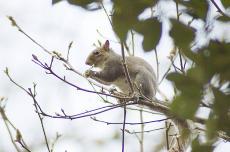A threat that plagued N.C. State is on the decline. The perpetrators sought to bring functions of the University to a stand still and leave students in the dark.
Their target is the life line of the University — electricity. These furry fiends were willing to give their lives for their cause.
The culprit of these attacks on our electrical system are Sciurus carolinensis, commonly known as the Eastern Gray Squirrel.
“Squirrels are feisty little engineers,” Carole Coble, manager of the NCSU Solar House, said. “They are very detrimental creatures when they get the idea to chew on something, such the wires under our solar panels.”
According to Coble, a family of squirrels who were looking for a comfortable place to live attacked the Solar House about a year ago.
She said the squirrels entered the attic of Solar House by chewing through a PVC pipe. When the staff realized the squirrels were in the attic, they used non-lethal traps baited with peanut butter to capture and relocate five of the rodents. One, however, had already carried out his accidental suicide mission.
“I think he chewed on the wire just because it was there,” Coble said. “It’s a shame; his family was just looking for a cool place to nest in the summertime.”
Since the attack, the Solar House staff has decided to replace the 20-year-old solar panels on the roof with more state-of-the-art technology. The new roofing system prevents squirrels and other would be saboteurs from getting under the roof.
“I was really unaware to the epidemic of squirrel-shockings on campus, but we do have a lot of squirrels,” Mo Troyer, a senior in history, said. “The University should do a better job of protecting the electrical system, but if the squirrels are simply chewing on power lines, well that’s just natural selection.”
According to David Senter, the pest control technician for Facilities and Operations, the Solar House was the last big incident of squirrels dying at the hands of the University electrical system.
“The number of animal related power outages has dropped off in the past years,” Senter said. “It’s partly because of a group of hawks that live on campus and hunt the squirrels. I sometimes have to go out and pick up a headless squirrel that was the victim of a hawk, but we hardly get calls about them in the electrical system now-a-days.”
The most serious incident perpetrated by squirrels on campus happened around five years ago, according to Senter. He said a squirrel was fried on the power substation next to the West Dunn Building on Central Campus; the resulting power outage shut down the University for about half a day.
“I absolutely believe that a squirrel taking out a transformer could happen again,” Amanda Sain, a freshman in biomedical engineering, said. “Even though it would be a tragedy and the squirrel would die, I wouldn’t have class so it wouldn’t be too bad.”
Other than squirrels, rats are the only other animal that pose a significant threat to electrical wires, Senter said.
He said the university sealed most of the electrical vaults on campus. The main transformer near the motor pool is located in a wide open area far from any trees, which deters all but the most brazen, or confused, squirrel from even attempting suicide.
“I think it’s sad that the squirrels don’t even know they’re going to die when they chew on the wires,” Becca Morris, a freshman in First Year College, said. “Good thing they no longer can get into some places where there are wires.”
Senter said he gets more calls about snakes invading buildings, bats flying through open windows and animals being flattened on streets than calls about squirrels viciously assaulting the power grid.
“Vehicles are much more dangerous to squirrels than our power system,” Senter said. “Hawks and cars keep the squirrels in check. I just pick up the remains.”








